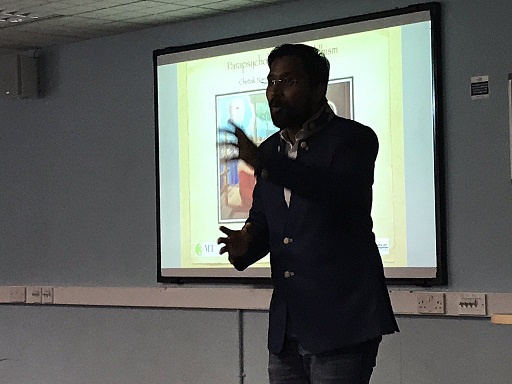Annual postgrad conference showcases Diversity
Date 18.09.2017
18.09.2017
Next gen mobiles, the works of Hanif Kureishi, and the behaviour of pet rabbits were just three of the topics covered during the Graduate School’s 2017 Research Conference.
‘Connected Communities: Diversity’ featured papers from 18 University of Northampton postgraduate researchers, presenting a varied mix of research areas.
The one-day event also featured the Graduate School’s first 3 Minute Thesis (3MT) competition, which was won by psychology researcher Chetak Nangare.
Conference attendees – made up of staff and students from across the University – also got to hear about the role of classroom Teaching Assistants, modern representations of Snow White’s Wicked Queen character, and the sustainability of solar farms.
Talks fell under one of five categories (‘Cultural shift”, “Identity”, “Behaviour”, “Environment” and “Technology”) and speakers included research students from every stage in the doctoral process.
Opening the conference, Chairman of the Board of Governors, Andrew Scarborough, said he was very impressed with the breadth of research on display.
Referring to the unpredictability of international events, he said the world “needed experts now more than ever”.
Several talks were concerned with conditions in Nigeria – looking at topics around flooding, excessive heat in high rises, smart electricity grids, and healthcare.
With judging by four members of staff from around the University, Chetak (pictured above) came first in the 3MT competition for his talk on ‘Parapsychology and Buddha’.
Special guest John Griff from BBC Radio Northampton awarded Chetak with his £25 first prize – along with the ‘People’s Choice’ award, which was additionally voted on by the audience.
Developed by The University of Queensland, 3MT requires students to explain their research in three minutes, in a language appropriate to a non-specialist audience, and with only one slide as a visual aid.
Other conference talks included the plight of Zimbabwean migrants in the UK, improving battery power in mobile devices, sectarianism within the Middle Eastern media, and the representation of Algeria in literary works.
Smartphone apps were the subject of two final talks; one considering them as possessions, the other looking at their use in English teaching in Algerian universities.